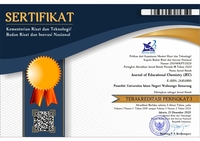The Implementation of STEM-Based Lipid E-Book on Student Learning Outcomes
DOI:
https://doi.org/10.21580/jec.2022.4.1.9715Keywords:
e-books, STEM, learning outcomes, lipidsAbstract
The purpose of the study was to analyze the effect of using lipid e-books using the STEM approach on student learning outcomes. The method uses pre-experimental research with one group pretest posttest design. This research was conducted at one of the State Universities in Bengkulu with the subject consisting of 26 students who took the Organic Chemistry 2 course. The instrument used in this study was a multiple choice test with 4 meetings in the form of pretest and posttest questions. Data analysis techniques include the average value (mean), normality test, and hypothesis testing using a t-test using the SPPS for windows version 23 computer program. The results showed the average score of the learning outcomes before using the lipid organic chemistry e-book was 54.90, while after using the e-book the average value is 79.81. The learning outcomes data were normally distributed and the t-test value showed Significant (2-tailed) 0.00. These results indicate that the developed STEM-based teaching materials can improve student learning outcomes in particular and are able to improve the quality of learning for organic chemistry 2 courses in general.Downloads
References
Aliyyah, R. R., Amini, A., Subasman, I., Herawati, E. S. B., & Febiantina, S. 2021. Upaya Meningkatkan Hasil Belajar Ipa Melalui Penggunaan Media Video Pembelajaran. Jurnal Sosial Humaniora, 12(1), 54-72.
Ariyatun. 2021. Analysis of Project Based Learning Integrated with Ethno-STEM on Students' Critical and Creative Thinking Skills. Journal of Educational Chemistry (JEC), 3(1), 35-44.
Damarsasi, D. G., & Saptorini, S. 2018. Pengembangan E-Modul Berbasis Flip Book Maker Materi. Jurnal Pendidikan Ilmu Sosial, 27(1), 1–10.
Hamalik, O. 2013. Proses Belajar Mengajar. Jakarta: PT.Bumi Aksara.
Handayani, D., Winarni, E. W., Sundaryono, A., & Firdaus, M. L. 2021. Implementation of Project-Based Learning Model with Edmodo Application in the Capita Selecta Chemistry Course. IJORER: International Journal of Recent Educational Research, 2(2), 184-195.
Hasbiyati, H., & Laila, K. 2017. Penerapan Media E-Book Bereksistensi EPUB untuk Meningkatkan Minat dan Hasil Belajar Siswa SMP pada Mata Pelajaran IPA. Jurnal Pena Sains, 4(1), 16-21.
Maulani, S., Nuraisyah, N., Zarina, D., Velinda, I., & Aeni, A. N. 2022. Analisis Penggunaan Video sebagai Media Pembelajaran Terpadu terhadap Motivasi Belajar Siswa. Jurnal Pendidikan dan Teknologi Indonesia, 2(1), 19-26.
NFH, A., & Rahman, E. S. 2020. Efektivitas Penerapan Interaktif E-Book Mata Pelajaran Pemrograman Dasar pada Siswa SMK. Jurnal MEDIA ELEKTRIK, 17(2), 14–18.
Oktaviani, A., Anom, K. & Lesmini, B. 2020. Pengembangan Modul Kimia terintegrasi STEM (Science, Technology, Engineering and Mathematics) dan PBL (Problem-Based Learning). Journal of Educational Chemistry (JEC), 3(1), 64-72.
Putri, Y. L. 2021. The Implementation of STEM-Based Approach to Increase Students Science Learning Activity on 8th Grade Students MTSN Solok. SEMESTA: Journal of Science Education and Teaching, 4(1), 78-86.
Ridha, M., Firman, F., & Desyandri, D. 2021. Efektifitas Penggunaan Media Video pada Pembelajaran Tematik Terpadu di Sekolah Dasar Saat Pandemi Covid-19. Jurnal Pendidikan Tambusai, 5(1), 154-162.
Seruni, R., Munawaoh, S., Kurniadewi, F., & Nurjayadi, M. 2019. Pengembangan Modul Elektronik (E-Module) Biokimia Ppda Materi Metabolisme Lipid menggunakan Flip Pdf Professional. JTK (Jurnal Tadris Kimiya), 4(1), 48–56.
Slameto. 2015. Belajar dan Faktor-Faktor yang Mempengaruhinya. Cetakan Keenam. Jakarta: PT Rineka Cipta.
Sudirman, Kistiono, & Taufiq. 2018. Pengembangan Modul Mata Kuliah Gelombang Berbasis STEM (Science, Technology, Engineering and Mathematics) pada Program Studi Pendidikan Fisika. Jurnal Inovasi dan Pembelajaran Fisika (JIPF), 5(2), 134–140.
Sudjana, N. 2013. Dasar-Dasar Proses Belajar Mengajar. Bandung: Sinar Baru Algesindo.
Suhendri, H. 2011. Pengaruh Kecerdasan Matematis-Logis dan Kemandirian Belajar Terhadap Hasil Belajar Matematika. Jurnal Formatif, 1(1), 29-39.
Sugiyono. 2012. Metode Penelitian Kuantitatif Kualitatif dan R&D. Bandung: Alfabeta.
Wahyuni, L., & Rahayu, Y. S. 2021. Pengembangan E-Book Berbasis Project Based Learning (PjBL) untuk Melatihkan Kemampuan Berpikir Kreatif pada Materi Pertumbuhan dan Perkembangan Tumbuhan Kelas XII SMA. Berkala Ilmiah Pendidikan Biologi (BioEdu), 10(2), 314–325.
Wulandari, V., Abidin, Z., & Praherdhiono, H. 2019. Pengembangan Media Pembelajaran E-Book Infografis Sebagai Penguatan Kognitif Siswa X MIA. Jurnal Kajian Teknologi Pendidikan, 2(1), 37–44.
Yulianti, R. N. E., Permanasari, A., & Heliawati, L. 2019. Pemanfaatan E-Book Konsep Asam Basa Dalam Pembelajaran Kimia Untuk Meningkatkan Literasi Kimia Siswa SMA Kelas XI. Journal of Science Education and Practice, 3(1), 33-41.
Yuliati, Y. 2017. Literasi Sains dalam Pembelajaran IPA. Jurnal Cakrawala Pendas, 3(2), 21-28.
Downloads
Published
How to Cite
Issue
Section
License
The copyright of the received article shall be assigned to the journal as the publisher of the journal. The intended copyright includes the right to publish the article in various forms (including reprints). The journal maintains the publishing rights to the published articles.
Authors are permitted to disseminate published articles by sharing the link/DOI of the article at the journal. Authors are allowed to use their articles for any legal purposes deemed necessary without written permission from the journal with an acknowledgment of initial publication to this journal.

This work is licensed under a Creative Commons Attribution-NonCommercial-ShareAlike 4.0 International License.


